外研版高中英语选修7 Module 3 Literature Period2 Reading(Oliver asks for more)课件(40张)
文档属性
| 名称 | 外研版高中英语选修7 Module 3 Literature Period2 Reading(Oliver asks for more)课件(40张) | 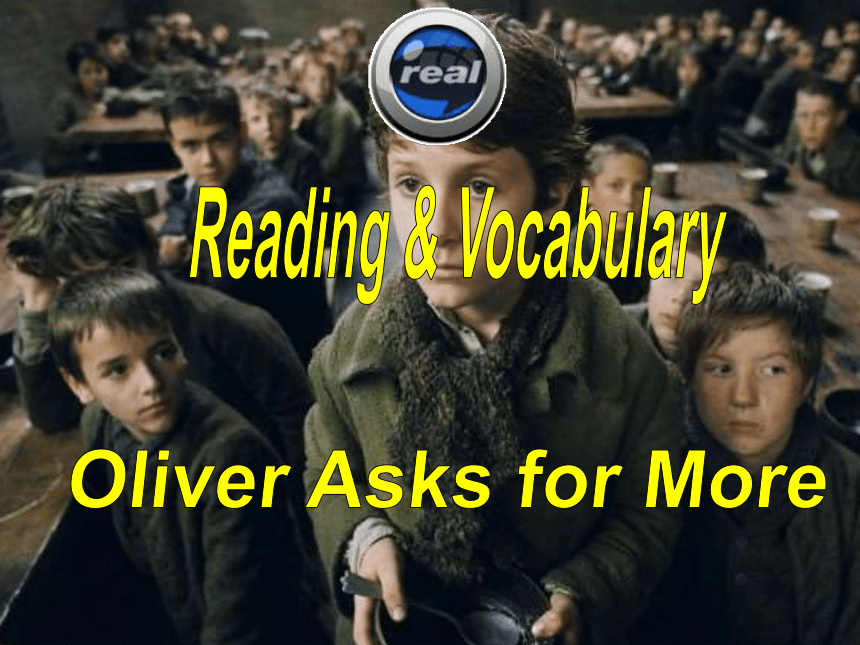 | |
| 格式 | zip | ||
| 文件大小 | 1.0MB | ||
| 资源类型 | 教案 | ||
| 版本资源 | 外研版 | ||
| 科目 | 英语 | ||
| 更新时间 | 2019-02-28 10:54:21 | ||
图片预览

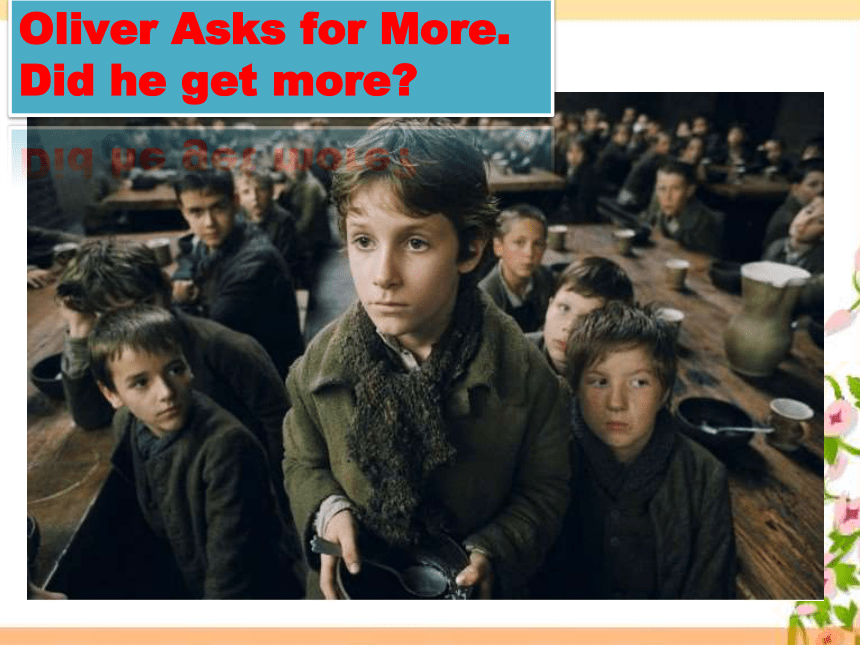
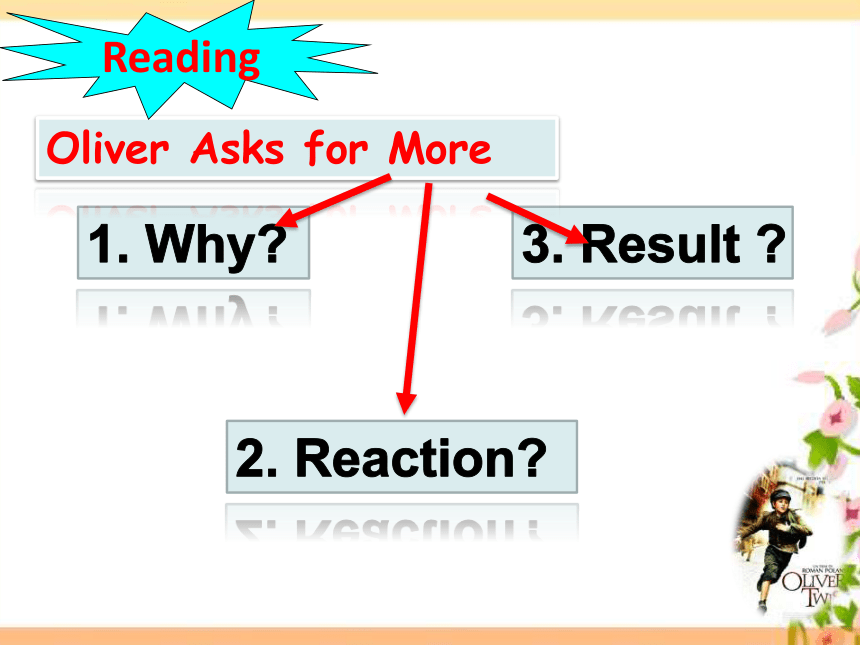
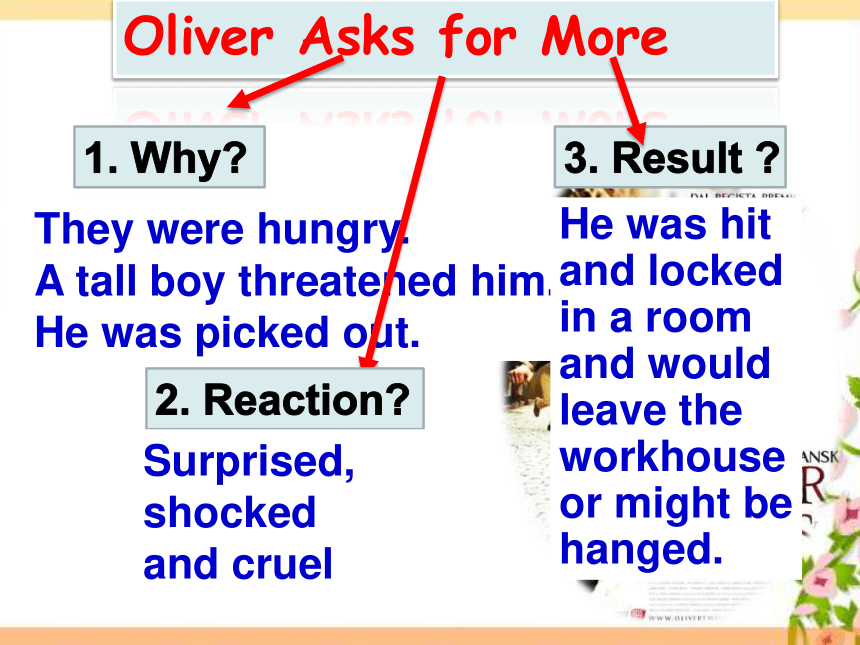
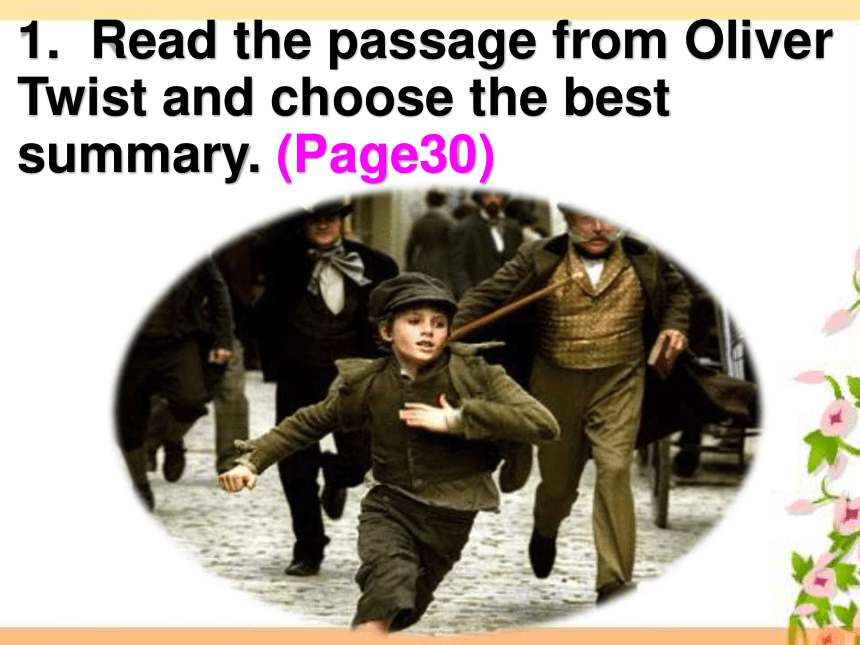
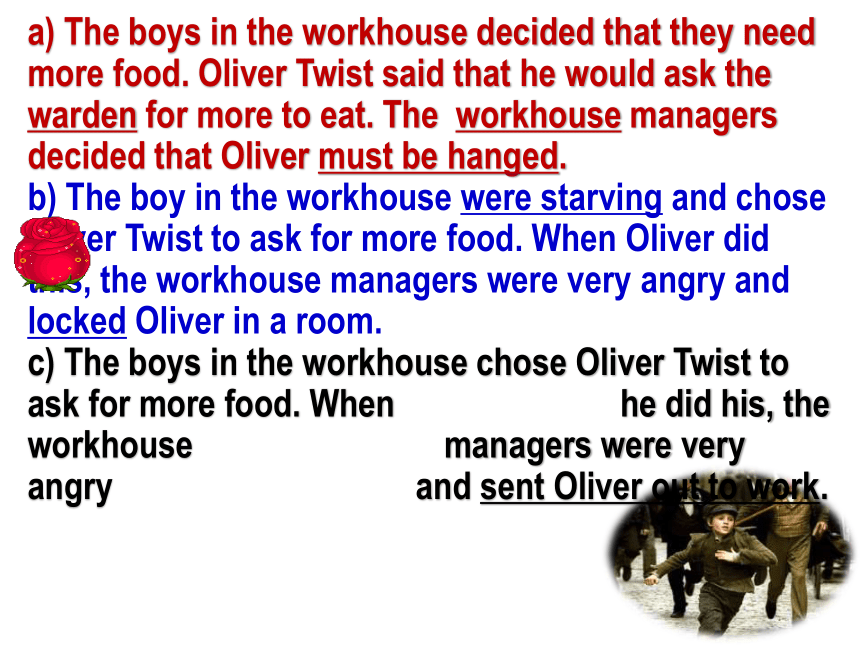
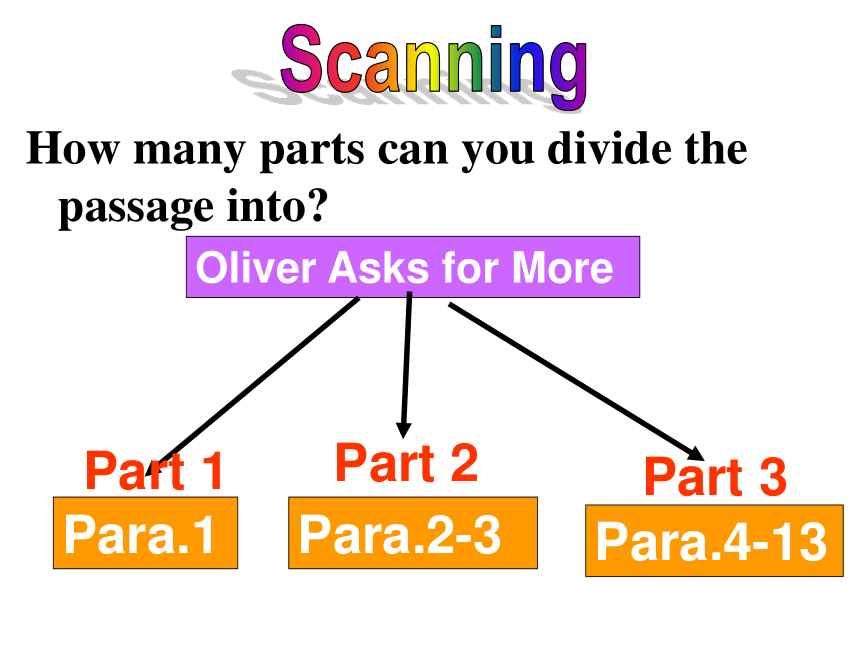
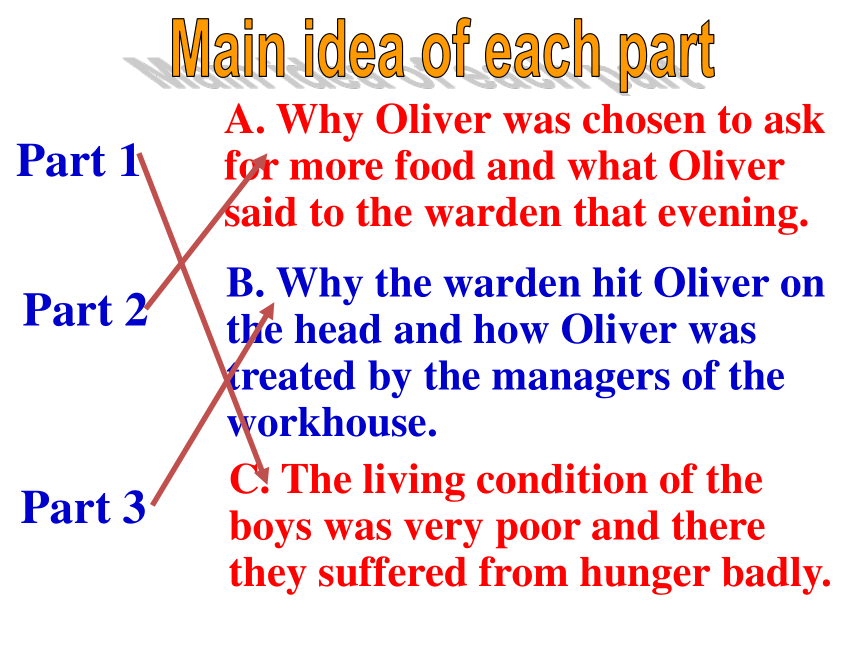
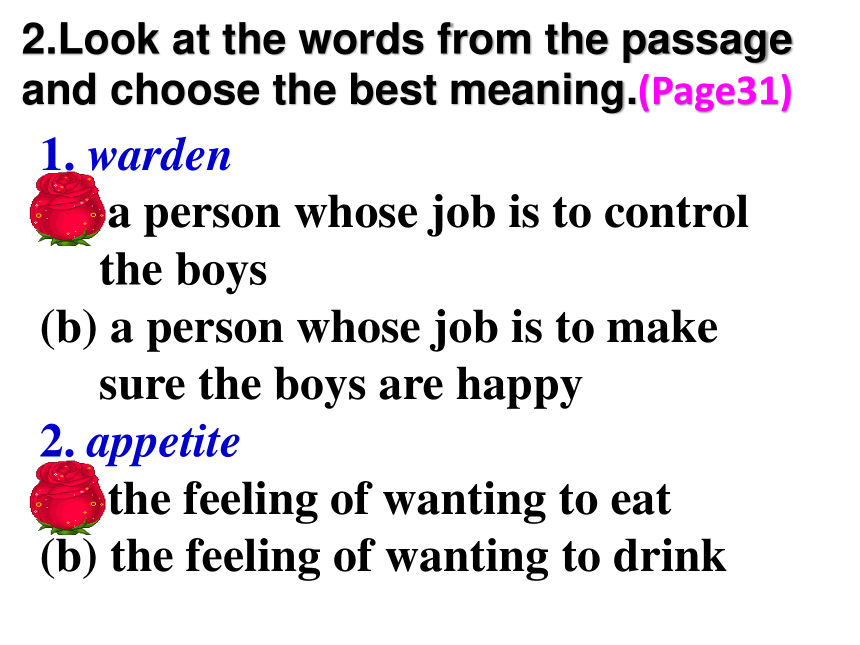
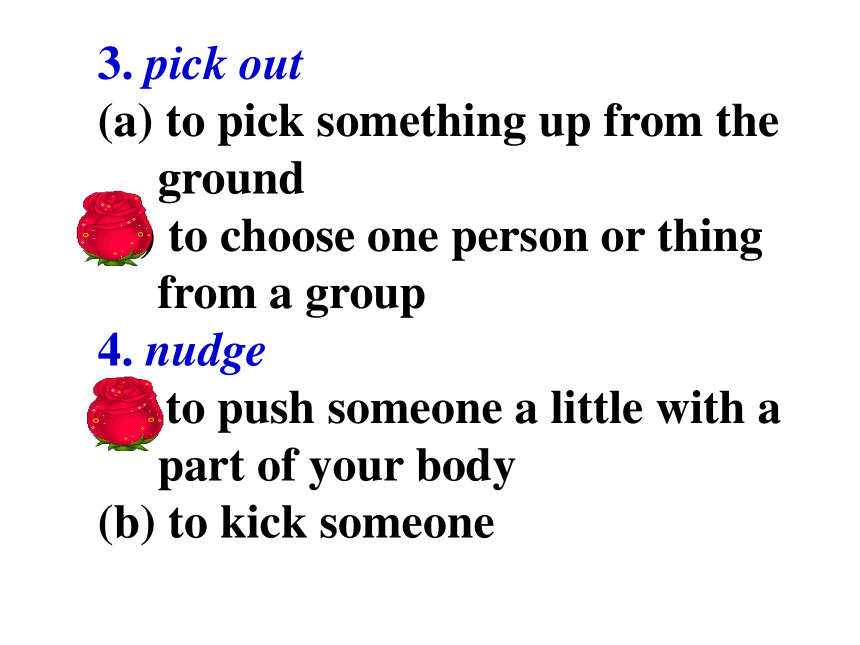
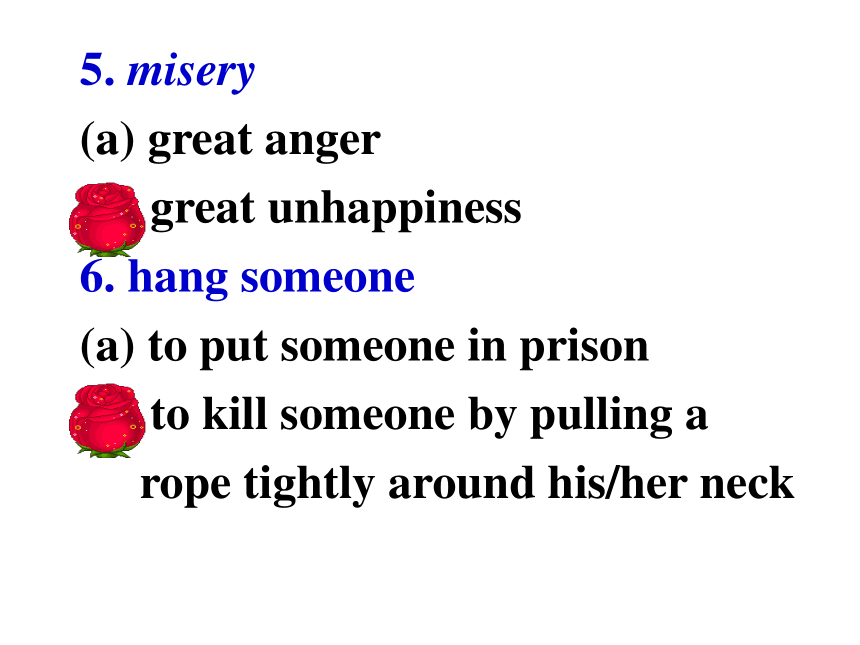
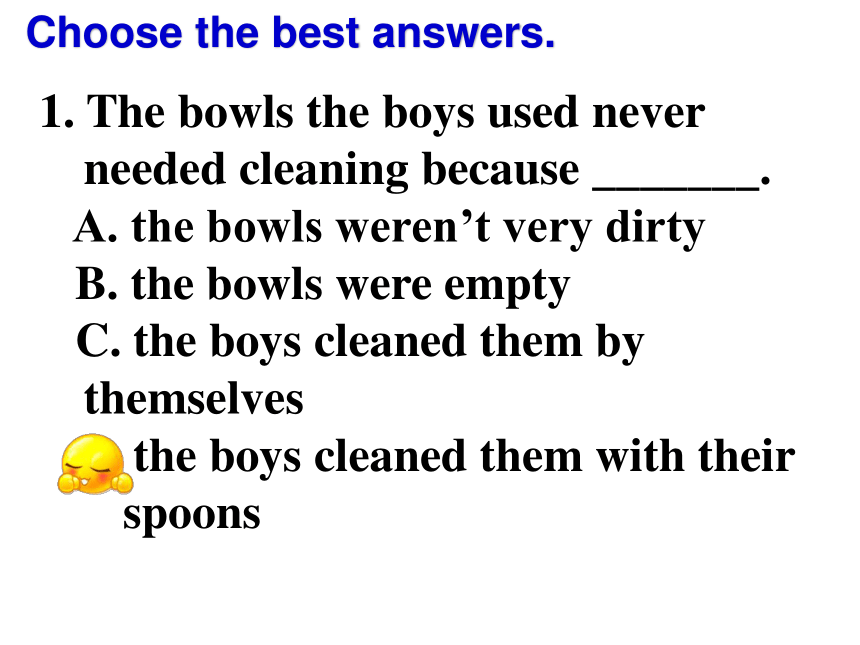
文档简介
课件40张PPT。Reading & Vocabulary
Oliver Asks for MoreOliver Asks for More.
Did he get more?1. Why?3. Result ?Oliver Asks for MoreReading 2. Reaction?1. Why?3. Result ?Oliver Asks for MoreThey were hungry.
A tall boy threatened him.
He was picked out.He was hit and locked in a room and would leave the workhouse or might be hanged. 2. Reaction?Surprised, shocked and cruel1. Read the passage from Oliver Twist and choose the best summary. (Page30)a) The boys in the workhouse decided that they need more food. Oliver Twist said that he would ask the warden for more to eat. The workhouse managers decided that Oliver must be hanged.
b) The boy in the workhouse were starving and chose Oliver Twist to ask for more food. When Oliver did this, the workhouse managers were very angry and locked Oliver in a room.
c) The boys in the workhouse chose Oliver Twist to ask for more food. When he did his, the workhouse managers were very angry and sent Oliver out to work.How many parts can you divide the passage into?Para.1Para.2-3Para.4-13Oliver Asks for MorePart 1Part 2Part 3ScanningC. The living condition of the boys was very poor and there they suffered from hunger badly.A. Why Oliver was chosen to ask for more food and what Oliver said to the warden that evening.B. Why the warden hit Oliver on the head and how Oliver was treated by the managers of the workhouse.Part 1Part 2Part 3Main idea of each part1. warden
(a) a person whose job is to control the boys
(b) a person whose job is to make sure the boys are happy
2. appetite
(a) the feeling of wanting to eat
(b) the feeling of wanting to drink2.Look at the words from the passage and choose the best meaning.(Page31)3. pick out
(a) to pick something up from the ground
(b) to choose one person or thing from a group
4. nudge
(a) to push someone a little with a part of your body
(b) to kick someone5. misery
(a) great anger
(b) great unhappiness
6. hang someone
(a) to put someone in prison
(b) to kill someone by pulling a rope tightly around his/her neck1. The bowls the boys used never needed cleaning because _______.
A. the bowls weren’t very dirty
B. the bowls were empty
C. the boys cleaned them by themselves
D. the boys cleaned them with their spoonsChoose the best answers.2. Which of the following sentences can
NOT describe the boys’ hunger?
A. Boys usually have excellent appetites.
B. They stared at the pot with eager eyes.
C. A tall boy was afraid that he might
eat the small young boy next to him.
D. Oliver Twist and his companions
finally became quite mild with
hunger.3. When Oliver went to ask for more food, his feeling was ________.
A. hopeful B. happy
C. desperate D. excited4. When Oliver asked for more food, the warden’s face became very pale
because he was ________.
A. frightened by Oliver’s words
B. astonished at Oliver’s words
C. very angry about Oliver’s words
D. ill badlyastonishment companion courage desperate eager employ reward seize support whisper3. Complete the sentences with the correct form of the words in the box.(Page32)1. He tried to find work, but no one wanted to _______ him.
2. The boy ______ the bowl of soup and started to eat it.seizedemploy3. When Mr Bumble returned to the room, the boys started __________ to each other.
4. Oliver and his ____________ had very little to eat.to whispercompanions5. When he told them what had happened, their faces showed ____________. “I don’t believe it!” one man said.
6. The child was weak from hunger and almost fell. “Help him, he needs _______!” said an older boy.astonishmentsupport7. The boys __________ wanted to leave the workhouse.
8. It was very brave of him. He has a lot of ________.couragedesperately9. They promised a ______ to anyone who could help them.
10. The children _______ explained what had happened.rewardeagerly4. Read the passage again and complete these sentences.(Page32)
1 On special holidays the boys were allowed to eat
___________________________.
2 The boys stared at the pot because_____________________
______________________another 60 grams of bread they were very hungry
and wanted more to eat.3 The boys decided that one of them should ask for more food because____________________________________________.
4 The warden’s face became very pale because__________________
________________________.
they thought one big boy would eat another small boy he was astonished
by what Oliver said5 When Oliver repeated his words, the warden _________________
______________
6 Mr Bumble told the managers of the workhouse that__________
_________________
hit him on the head
with the spoon. Oliver had
asked for more.7 In order to punish Oliver, the managers __________________
8 The managers did not want Oliver to___________________locked him in a room.stay in the workhouse.Key words in this passagedesperate adj.绝望的;拼命的;
desperately adv.绝望地;拼命地;
desperation n.绝望
reward n./v.报酬;奖金;酬谢
rewarding adj.值得的;有回报的
intend v.打算;计划;意图
intended adj.打算的;计划的
intention n.打算;意图 Key phrases in this passageat one end
have excellent appetites
become/be wild with hunger
be tall for his age
have a wild hungry look in his eyes
pick out
be desperate with hunger and misery 在一侧
胃口极好
饿极了
个子比同龄人偏高
眼里闪动着野性的饥饿目光
挑选出;认出
被饥饿和苦难逼得不顾一切stare at
in complete astonishment
hold on to
in a weak voice
no sooner...than...
hit him on the head
shout for sb
in great excitement 盯着;注视
吃惊地
抓紧;不放手
有气无力的声音
刚一...就...
敲打头部
呼叫...
极度激动
show complete astonishment
put up
offer a reward to...
I never was more sure of anything 显得极其惊诧
张贴;投诉;搭建
提供奖赏
我从未如此确定
1. The warden, helped by two women, served the soup from this pot at meal times. serve v. 端上(饭菜等)
serve sth. to sb. / serve sb. sth.
serve sb
serve as... Language pointsdesperate adj.
绝望的;非常需要,渴望 2. Oliver, who was desperate with hunger and misery, rose from the table and walked towards the master with his bowl and spoon in his hand.???????????????
翻译:
奥利弗已经被饥饿与苦难逼得什么都顾不上了,他从桌边站起来, 手里拿着碗和汤匙,朝管理员走去。试译:汤姆对第二天将要举行的考试感到紧张,他手里拿着一本书,在房间里走来走去。 Tom, who was nervous at the exam to be held the next day, walked up and down in the room with a book in his hand.? 3. No sooner had the boy spoken these words than the warden hit him on the head with the soupspoon.
no sooner ... than 刚一……就
no sooner主句常用过去完成时,than从句用一般过去时。
当no sooner位于句首时,谓语进行___________。 部分倒装 1.他刚要去睡觉, 电话就又一次的响了。
2.我们刚到家门口他就回来了。No sooner had he gone to sleep
than the telephone rang once
more. We had no sooner reached the
door than he came back. 类似结构还有:
hardly (+过去完成时) when (+一
般过去时) : 刚……就……
e.g. 我们刚一进来就开始下雨了。
We had hardly got in
when it began to rain. 4. Then he seized Oliver’s arms and
held him, while he shouted for Mr
Bumble. seize v.抓住;抓住(时间、机会等);夺取,攻占 e.g.
1.Seize the day, seize the hour.?
2.He seized me by the hand and
dragged me from the window.
3.The soldiers seized the city
after a hard fight.5. The next morning a notice was put up on the door of the workhouse, offering a reward to anybody who would employ Oliver Twist.??翻译:??
第二天早晨,济贫院大门上贴出了一张告示,向愿意雇佣奥利弗·特威斯特的人提供奖赏。【翻译】上周,这个公司的网站上公布了一则通知,向愿意当志愿者的人提供奖励。 Last week, a notice was put on the website of the company, offering a reward to anybody who wanted to be volunteers.
Oliver Asks for MoreOliver Asks for More.
Did he get more?1. Why?3. Result ?Oliver Asks for MoreReading 2. Reaction?1. Why?3. Result ?Oliver Asks for MoreThey were hungry.
A tall boy threatened him.
He was picked out.He was hit and locked in a room and would leave the workhouse or might be hanged. 2. Reaction?Surprised, shocked and cruel1. Read the passage from Oliver Twist and choose the best summary. (Page30)a) The boys in the workhouse decided that they need more food. Oliver Twist said that he would ask the warden for more to eat. The workhouse managers decided that Oliver must be hanged.
b) The boy in the workhouse were starving and chose Oliver Twist to ask for more food. When Oliver did this, the workhouse managers were very angry and locked Oliver in a room.
c) The boys in the workhouse chose Oliver Twist to ask for more food. When he did his, the workhouse managers were very angry and sent Oliver out to work.How many parts can you divide the passage into?Para.1Para.2-3Para.4-13Oliver Asks for MorePart 1Part 2Part 3ScanningC. The living condition of the boys was very poor and there they suffered from hunger badly.A. Why Oliver was chosen to ask for more food and what Oliver said to the warden that evening.B. Why the warden hit Oliver on the head and how Oliver was treated by the managers of the workhouse.Part 1Part 2Part 3Main idea of each part1. warden
(a) a person whose job is to control the boys
(b) a person whose job is to make sure the boys are happy
2. appetite
(a) the feeling of wanting to eat
(b) the feeling of wanting to drink2.Look at the words from the passage and choose the best meaning.(Page31)3. pick out
(a) to pick something up from the ground
(b) to choose one person or thing from a group
4. nudge
(a) to push someone a little with a part of your body
(b) to kick someone5. misery
(a) great anger
(b) great unhappiness
6. hang someone
(a) to put someone in prison
(b) to kill someone by pulling a rope tightly around his/her neck1. The bowls the boys used never needed cleaning because _______.
A. the bowls weren’t very dirty
B. the bowls were empty
C. the boys cleaned them by themselves
D. the boys cleaned them with their spoonsChoose the best answers.2. Which of the following sentences can
NOT describe the boys’ hunger?
A. Boys usually have excellent appetites.
B. They stared at the pot with eager eyes.
C. A tall boy was afraid that he might
eat the small young boy next to him.
D. Oliver Twist and his companions
finally became quite mild with
hunger.3. When Oliver went to ask for more food, his feeling was ________.
A. hopeful B. happy
C. desperate D. excited4. When Oliver asked for more food, the warden’s face became very pale
because he was ________.
A. frightened by Oliver’s words
B. astonished at Oliver’s words
C. very angry about Oliver’s words
D. ill badlyastonishment companion courage desperate eager employ reward seize support whisper3. Complete the sentences with the correct form of the words in the box.(Page32)1. He tried to find work, but no one wanted to _______ him.
2. The boy ______ the bowl of soup and started to eat it.seizedemploy3. When Mr Bumble returned to the room, the boys started __________ to each other.
4. Oliver and his ____________ had very little to eat.to whispercompanions5. When he told them what had happened, their faces showed ____________. “I don’t believe it!” one man said.
6. The child was weak from hunger and almost fell. “Help him, he needs _______!” said an older boy.astonishmentsupport7. The boys __________ wanted to leave the workhouse.
8. It was very brave of him. He has a lot of ________.couragedesperately9. They promised a ______ to anyone who could help them.
10. The children _______ explained what had happened.rewardeagerly4. Read the passage again and complete these sentences.(Page32)
1 On special holidays the boys were allowed to eat
___________________________.
2 The boys stared at the pot because_____________________
______________________another 60 grams of bread they were very hungry
and wanted more to eat.3 The boys decided that one of them should ask for more food because____________________________________________.
4 The warden’s face became very pale because__________________
________________________.
they thought one big boy would eat another small boy he was astonished
by what Oliver said5 When Oliver repeated his words, the warden _________________
______________
6 Mr Bumble told the managers of the workhouse that__________
_________________
hit him on the head
with the spoon. Oliver had
asked for more.7 In order to punish Oliver, the managers __________________
8 The managers did not want Oliver to___________________locked him in a room.stay in the workhouse.Key words in this passagedesperate adj.绝望的;拼命的;
desperately adv.绝望地;拼命地;
desperation n.绝望
reward n./v.报酬;奖金;酬谢
rewarding adj.值得的;有回报的
intend v.打算;计划;意图
intended adj.打算的;计划的
intention n.打算;意图 Key phrases in this passageat one end
have excellent appetites
become/be wild with hunger
be tall for his age
have a wild hungry look in his eyes
pick out
be desperate with hunger and misery 在一侧
胃口极好
饿极了
个子比同龄人偏高
眼里闪动着野性的饥饿目光
挑选出;认出
被饥饿和苦难逼得不顾一切stare at
in complete astonishment
hold on to
in a weak voice
no sooner...than...
hit him on the head
shout for sb
in great excitement 盯着;注视
吃惊地
抓紧;不放手
有气无力的声音
刚一...就...
敲打头部
呼叫...
极度激动
show complete astonishment
put up
offer a reward to...
I never was more sure of anything 显得极其惊诧
张贴;投诉;搭建
提供奖赏
我从未如此确定
1. The warden, helped by two women, served the soup from this pot at meal times. serve v. 端上(饭菜等)
serve sth. to sb. / serve sb. sth.
serve sb
serve as... Language pointsdesperate adj.
绝望的;非常需要,渴望 2. Oliver, who was desperate with hunger and misery, rose from the table and walked towards the master with his bowl and spoon in his hand.???????????????
翻译:
奥利弗已经被饥饿与苦难逼得什么都顾不上了,他从桌边站起来, 手里拿着碗和汤匙,朝管理员走去。试译:汤姆对第二天将要举行的考试感到紧张,他手里拿着一本书,在房间里走来走去。 Tom, who was nervous at the exam to be held the next day, walked up and down in the room with a book in his hand.? 3. No sooner had the boy spoken these words than the warden hit him on the head with the soupspoon.
no sooner ... than 刚一……就
no sooner主句常用过去完成时,than从句用一般过去时。
当no sooner位于句首时,谓语进行___________。 部分倒装 1.他刚要去睡觉, 电话就又一次的响了。
2.我们刚到家门口他就回来了。No sooner had he gone to sleep
than the telephone rang once
more. We had no sooner reached the
door than he came back. 类似结构还有:
hardly (+过去完成时) when (+一
般过去时) : 刚……就……
e.g. 我们刚一进来就开始下雨了。
We had hardly got in
when it began to rain. 4. Then he seized Oliver’s arms and
held him, while he shouted for Mr
Bumble. seize v.抓住;抓住(时间、机会等);夺取,攻占 e.g.
1.Seize the day, seize the hour.?
2.He seized me by the hand and
dragged me from the window.
3.The soldiers seized the city
after a hard fight.5. The next morning a notice was put up on the door of the workhouse, offering a reward to anybody who would employ Oliver Twist.??翻译:??
第二天早晨,济贫院大门上贴出了一张告示,向愿意雇佣奥利弗·特威斯特的人提供奖赏。【翻译】上周,这个公司的网站上公布了一则通知,向愿意当志愿者的人提供奖励。 Last week, a notice was put on the website of the company, offering a reward to anybody who wanted to be volunteers.
